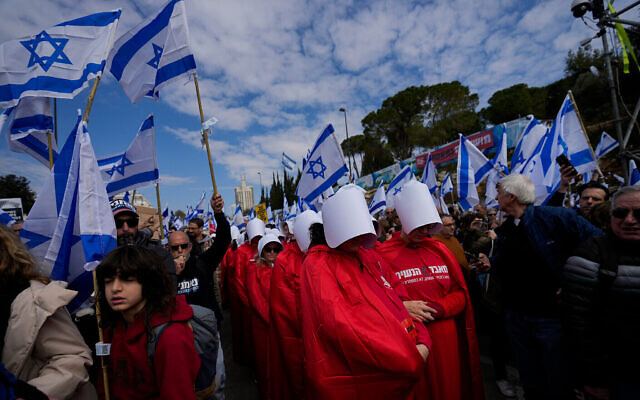Protests are altering Israel’s trajectory, says Handmaid’s writer
At Jerusalem Writers Festival, the Canadian author behind The Handmaid's Tale, Margaret Atwood, talks judicial reform, saying she isn’t surprised that hundreds of Israeli women are utilising the vivid visual themes from the book.

Margaret Atwood, the Canadian author of the dystopian novel-turned-TV show The Handmaid’s Tale, isn’t surprised that hundreds of Israeli women are utilising the vivid visual themes from the book, dressing in red capes and white caps to appear at the weekly protests against the government.
“You’re seeing it in Israel right now because it is a protest against a proposed totalitarian takeover of a democracy, let’s not call it anything else,” said Atwood, speaking in a video conference conversation with Julia Fermentto Tzaisler, artistic director of the 11th Jerusalem International Writers Festival.
“You and your situation right now, what it is is… people trying to seize total power,” said Atwood, whose 1985 dystopian novel is set in a near-future New England in a patriarchal world in which “handmaids” are women forcibly assigned to produce children for the ruling class.
“If you control the judiciary and just rubber stamp for the government, it might as well be Stalinist 1930s,” she added.

Atwood commented that while she’s seen her fictional handmaids appear at other protests worldwide, including in Texas, Argentina and Ireland, she’s never seen as many as have appeared at the various Israeli protests.
“It could have been a short right out of the television series,” she said. “It’s very choreographed and visual.”
Fermentto Tzaisler and Atwood discussed whether Atwood’s works had been prescient.
“I’m not a prophet,” said the 83-year-old Atwood. “I don’t know what’s going to happen, no one does, because there is no one future.”
That said, Atwood said that Israel’s current trajectory has already been altered by the protests.
“The people in power, the king, he is going to have to take into account that an awful lot of people in the country think what he is doing is wrong,” said Atwood, apparently referencing Prime Minister Benjamin Netanyahu.
Atwood spoke about dystopias and utopias, saying it has become “less and less possible to write about utopias because people believed in them less.
“But now I think we’re seeing some more positive thinking, that totalitarians can be reversed and we can do a lot about the situation of the planet,” she added, referring to climate change — one of Atwood’s favoured topics.
“If you control the judiciary and just rubber stamp for the government, it might as well be Stalinist 1930s…”
Protests are a form of positive thinking that’s needed if people are going to change anything, she said.
Atwood and Fermentto Tzaisler also touched on social media and its destabilising elements, while Atwood pointed out that every form of communication technology has been destabilising.
The ancient Greeks were worried about writing, she said, concerned that it would negate the need to verbally recall their history, while subsequent modernisations, such as the printing press, telegraph, radio, television and other communication devices had their pluses and minuses.
“No communication device has been noble through and through,” said Atwood. “And now Twitter; Elon Musk, how good is that and how much is he adhering to his own principles?”
Atwood’s 53-minute conversation with Fermentto Tzaisler was the first of more than two dozen events being held throughout the four-day Jerusalem Writers Festival taking place at Jerusalem’s Mishkenot Sha’ananim complex.
Events are taking place in person with visiting writers as well as online throughout the course of the event.
Times of Israel

comments